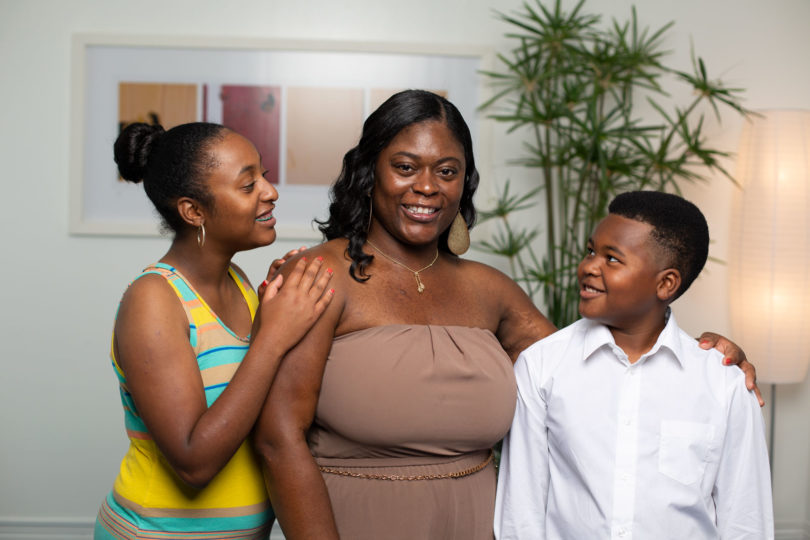Inside Kaniah Gunter is a strong, healthy young girl — the person she was before she was diagnosed with a rare connective tissue disorder.
Gunter, 35, has a long list of strategies to fight her pain, weakness, swelling and skin lesions, including intravenous medications, physical therapy, massage, hot baths, special soaps and lotions, singing and composing, journaling, an antioxidant-rich diet, green tea, exercise and a powerful faith in God.
No less importantly, she also nurtures that inner child, which is her advice to anyone coping with a serious health issue.
That has meant roller skating with her two children, playing basketball, flying kites, going on carnival rides and rolling down the big hill at Mount Trashmore Park.
“I’ve been acting in ways I never thought I would again,” Gunter says. “I hadn’t skated since I was 12, but I showed my kids that Mama’s still got the moves. I like to tell them, ‘Yep, I’ve got the go-go juice today.’ If I can feel like myself again, it makes me feel like I’ve got some control of this thing.”
Gunter, who lives in Norfolk, Va., has dermatomyositis, a chronic inflammatory disease in which her immune system mysteriously attacks her own skin and muscles. She also has a devastating complication called calcinosis, which is marked by the growth of hard calcium deposits inside soft tissues throughout her body that can cause crippling pain and occasionally break through her skin.
Diagnosed in 2007, Gunter has a severe form of the illness, says Dr. Lisa Christopher-Stine, director of the Johns Hopkins Myositis Center and one of her doctors. The single mother already has endured several major surgeries and skin grafts on both legs to remove calcifications that left her unable to walk or even sit comfortably.
Over the years, Gunter’s symptoms have included difficulty swallowing and breathing, extreme weight loss, high blood pressure, mobility issues due to poor limb extension, swollen hands, hair loss, acid reflux, skin rashes and dehydration. Some complications have required hospitalization.
Yet Gunter is also one of the most upbeat patients at Johns Hopkins, where she travels every three months for intravenous treatments designed to quiet her immune system. “Her calcinosis in particular is relentless, but she won’t be victimized by it,” Christopher-Stine says. “She lives with a positive attitude and a spirit that shines through everything. She teaches us how to live, really.”
Dermatomyositis — so rare it’s only diagnosed in fewer than 10 people per million each year — has no known cure. It can be progressive or suddenly flare up. Doctors sometimes can stall or reverse its advances, although they haven’t been as successful at targeting calcinosis. “The hope is that with good care, patients’ lifespans will be normal or near normal,” Christopher-Stine says. “Then the challenge becomes giving them a good quality of life as well.”
Before her diagnosis, Gunter tried to deny the fatigue and pain that interfered with simple tasks such as dressing or showering. “In a split second my life changed from working, providing and taking care of my kids to my dreams being shattered,” she recalls. “I looked in the mirror and didn’t see the same person.”
In 2008, Gunter enjoyed a brief remission while pregnant with her second child, son DaShuan, now 9. But the disease returned in full force in 2010, and she had to leave her job as a clinical laboratory assistant in 2012. She is now on permanent disability.
A native of Virginia’s Eastern Shore, Gunter was a gifted basketball, volleyball and track athlete at Nandua High School. Determined never to forget that, she pushes herself to take even small outings such as treating DaShuan and his sister Shaniah, 15, to Tropical Smoothie.
“Our mom is a fighter and strong,” says Shaniah, who herself wears a leg brace for mild cerebral palsy.
“She shows us the purpose of living, making us laugh all the time. She always tells us not to be afraid and give everything your best shot.”
Gunter has learned to advocate for herself, researching her illness and lining up tests; educating family, friends and anyone who will listen; and finding the best doctors to help her attack it. Her team includes physicians at Sentara Norfolk General Hospital and George Washington Medical Faculty Associates in Washington, D.C. For the moment, her disease is mostly in remission.
Each day is about wellness, often starting with morning worship music. Gunter drinks mostly water, eats fruits and vegetables that fight inflammation, does walks or 45-minute treadmill sessions several times a week and always wears sunscreen and hats to protect her fragile skin. While she can’t use makeup, she can do her hair and dress well. “I have scars, and I wear them really well,” she says. “I see beauty now.”
The girl inside hasn’t given up.
“I can say I’m moving forward, because I am facing this head on and living,” Gunter says. “I feel this has set me free from hardships, stress, depression, pain, fear and worrying. Even if my disease ever beats me down, I’ve already won.”



